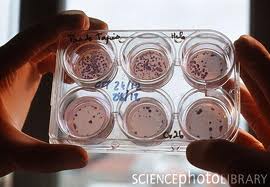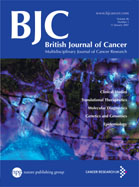导读:在抗癌领域,医学斗士们抑制及杀死癌细胞的“武器”早已不仅是各种药物,他们或查找并唤醒人体内的对癌症的免疫系统,或另辟蹊径阻断癌细胞的生路。不过,处于前期的种种观察测试,只是提供一个方向,当前所有针对癌症的药物和治疗手段的筛选,仍需依靠临床效果进行判断。

英国伦敦圣·乔治大学最新研究显示,癌细胞发送到体内各处的通讯信号包含了许多RNA片断,对癌症的生长至关重要。这些物质是一段基因编码,像DNA一样能对细胞发号施令,最终夺取机体的控制权。研究人员指出,目前有一种观点认为,可以通过刺激机体免疫系统的方法来治疗癌症,该发现为这一观点增加了证据。相关论文发表在《英国癌症期刊》网站上。
肿瘤细胞生长过程中的一个重要步骤就是产生一种化学物质,传送到身体其他部分,指示这些地方的细胞形成利于肿瘤生长繁荣的环境,一个重要的因素就是形成新的血管。由这些血管向肿瘤细胞供给养分,这一过程称为血管再生。此前的研究认为,血管再生过程是由一种名为细胞因子的化学信号所引发。
圣·乔治大学研究人员对人类肺癌细胞培养观察发现,肿瘤也能送出成批的RNA,就像细胞因子那样,指示生成血管以供养肿瘤。他们用两种最常用的抗癌药——环磷酰胺和奥沙利铂对血管再生进行了效果测试,即将肿瘤产生的RNA信息素进行了培养,然后分别让未经药物处理的癌细胞和经过药物处理的癌细胞来传递。结果发现,肺癌细胞经过奥沙利铂处理后,肿瘤产生RNA和细胞因子信息不能再影响血管生长;经过环磷酰胺处理的肺癌细胞,仍然能利用这些化学信息来指示血管供养肿瘤。
研究人员刘崴(音译)说:“目前的抗癌药物要么攻击肿瘤细胞本身,要么靠打乱身体和肿瘤的相互作用来对付癌细胞。只有很少部分是瞄准肿瘤细胞之间的信号,而这些信号构成了肿瘤生长的微环境。此前人们很少知道这些信号是怎么形成的,该研究让我们能更多地了解癌细胞是怎样产生这些信号,并为它们开辟出通向远处的传输道路。”

Supernatants derived from chemotherapy-treated cancer cell lines can modify angiogenesis
W M Liu, J L Dennis, A M Gravett, C Chanthirakumar, E Kaminska, G Coulton, D W Fowler, M Bodman-Smith, A G Dalgleish
There is evidence that tumours produce substances such as cytokines and microvesicular bodies bearing bioactive molecules, which support the carcinogenic process. Furthermore, chemotherapy has also been shown to modify these exudates and in doing so, neutralise their tumourigenic influence. METHODS: In the current study, we have investigated the effect of chemotherapy agents on modifying the cytokine profile and microvesicular cargo of supernatants derived from cancer cell lines. In addition, we have explored the effect of these tumour-derived supernatants on angiogenesis, and how chemotherapy can alter the supernatants rendering them less pro-angiogenic. RESULTS: Herein, we show that supernatants contain a rich cocktail of cytokines, a number of which are potent modulators of angiogenesis. They also contain microvesicular bodies containing RNA transcripts that code for proteins involved in transcription, immune modulation and angiogenesis. These supernatants altered intracellular signalling molecules in endothelial cells and significantly enhanced their tubulogenic character; however, this was severely compromised when supernatants from tumours treated with chemotherapy was used instead. CONCLUSION: This study suggests tumour exudates and bioactive material from tumours can influence cellular functions, and that treatment with some chemotherapy can serve to negate these pro-tumourigenic processes.
文献链接:https://www.nature.com/bjc/journal/vaop/ncurrent/abs/bjc201213a.html








